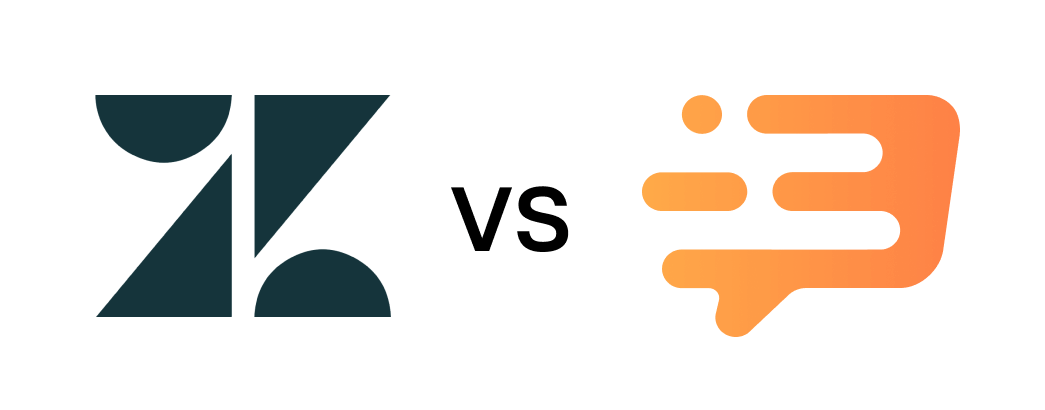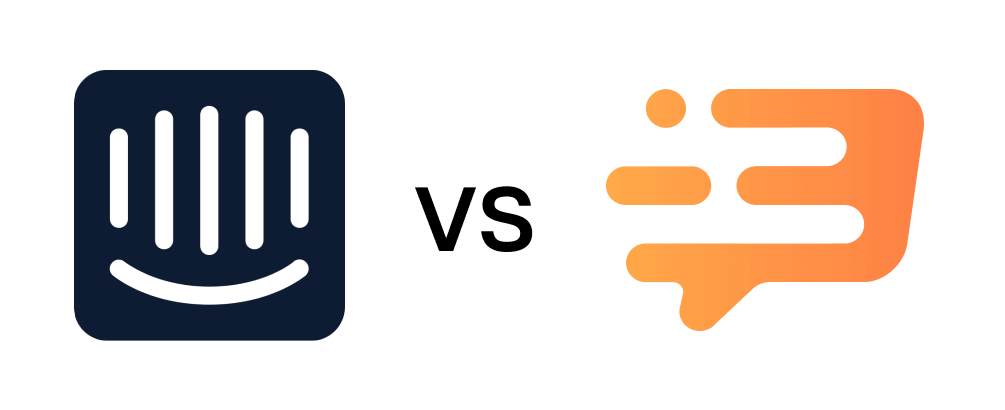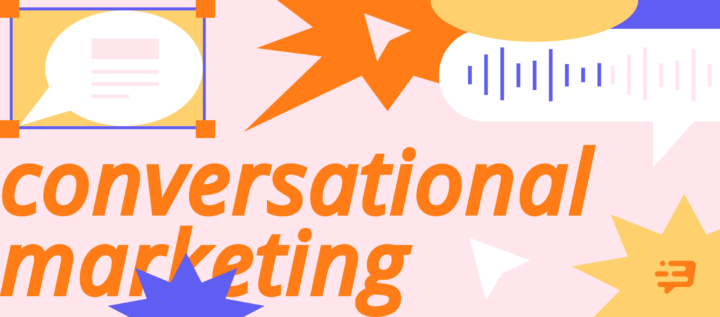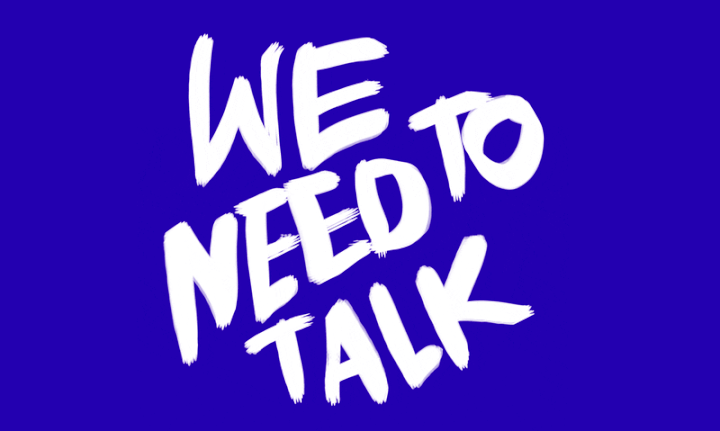15 platforms to boost customer engagement on your website
Learn how to provide in-time conversational experience on your website with the best customer engagement tips, scenarios, and tools
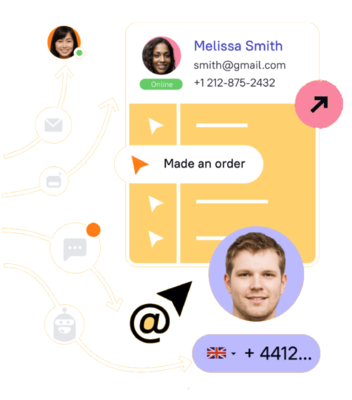
Part 3
15 platforms to boost customer engagement on your website
You spend so much on lead capturing, but users still visit your website and don’t perform an essential action. Sounds familiar? You’re not alone: over 75% of marketers say that customer engagement on their website is lower than they want it to be, especially on the early stages of the funnel.
So the question is: how to overcome this problem and increase customer engagement?
There are many customer engagement tactics for eCommerce or SaaS, and many tools you can use — pop-ups, triggered emails, chatbots, or live chat. The bad news is that usually, these are different tools. Often businesses need to pay for each of these instruments separately, which might be quite costly.
That’s why businesses tend to choose customer engagement platforms.
What Is a Customer Engagement Platform?
A customer engagement platform is software that helps build interaction with prospects and customers at each marketing funnel stage. To do it, customer engagement platforms combine several marketing instruments: chatbots, pop-ups, triggered emails, etc.
Such platforms help marketing, support, and sales teams by combining several listed tools, saving money, and building better customer engagement. For example, you don’t have to integrate platforms that collect prospects via chatbot to send engagement emails.
How does a customer engagement platform work?
Think of a customer engagement platform like Dashly.io as your ultimate wingman. It’s an engagement software that hustles hard to amp up your customer experiences. How? By intelligently combing through customer data, getting the lowdown on their digital walkthrough, aka their customer journey data. This is cool ’cause it lets you dive into your customers’ world, enhancing those all-important customer relationships.
But it doesn’t stop there. Dashly.io packs a powerful punch with on-point sales and support too, solving issues in a flash. From understanding what rings your customers’ bell to providing them with fast and helpful support, Dashly.io is the real deal in managing and improving your customer’s journey. In short, it’s your gateway to a killer, personalized user’s experience.
What are the benefits of using a customer engagement platform?
- Engagement platforms elevate customer interactions, making customers 90% more likely to make repeated purchases and spend 60% more per transaction (Gallup).
- When businesses use top-notch engagement companies, they can excel by up to 147% in earnings per share compared to those who resist engagement strategies (Gallup).
- Fast and effective customer service is achievable with these customer engagement solutions. Businesses see a 20% increase in customer satisfaction rates and can reduce service costs by up to 25% (McKinsey).
In a nutshell, embracing customer engagement platforms and solutions can substantially pump up your business performance, sales, and customer satisfaction. Stats validate that fostering customer relationships isn’t just nice to do, it’s excellent for business!
Top 15 customer engagement platforms to skyrocket your lead conversions
Whether you’re looking for a specific tool or a complete platform, here are 15 customer engagement software options that will get you on the road to building a better relationship with your customers.
- Dashly
- Zendesk
- Twilio
- Bold360 (Genesys DX)
- Intercom
- Freshdesk
- Tidio
- Engati
- EngageBay
- UserLike
- Salesforce
- Pega
- Zoho CRM
- Eudata
- LivePerson
We know so much info might be overwhelming. So to help you make a decision, we’ve made a table with engagement tools’ cost so you can find the most affordable one in the segment for your business.
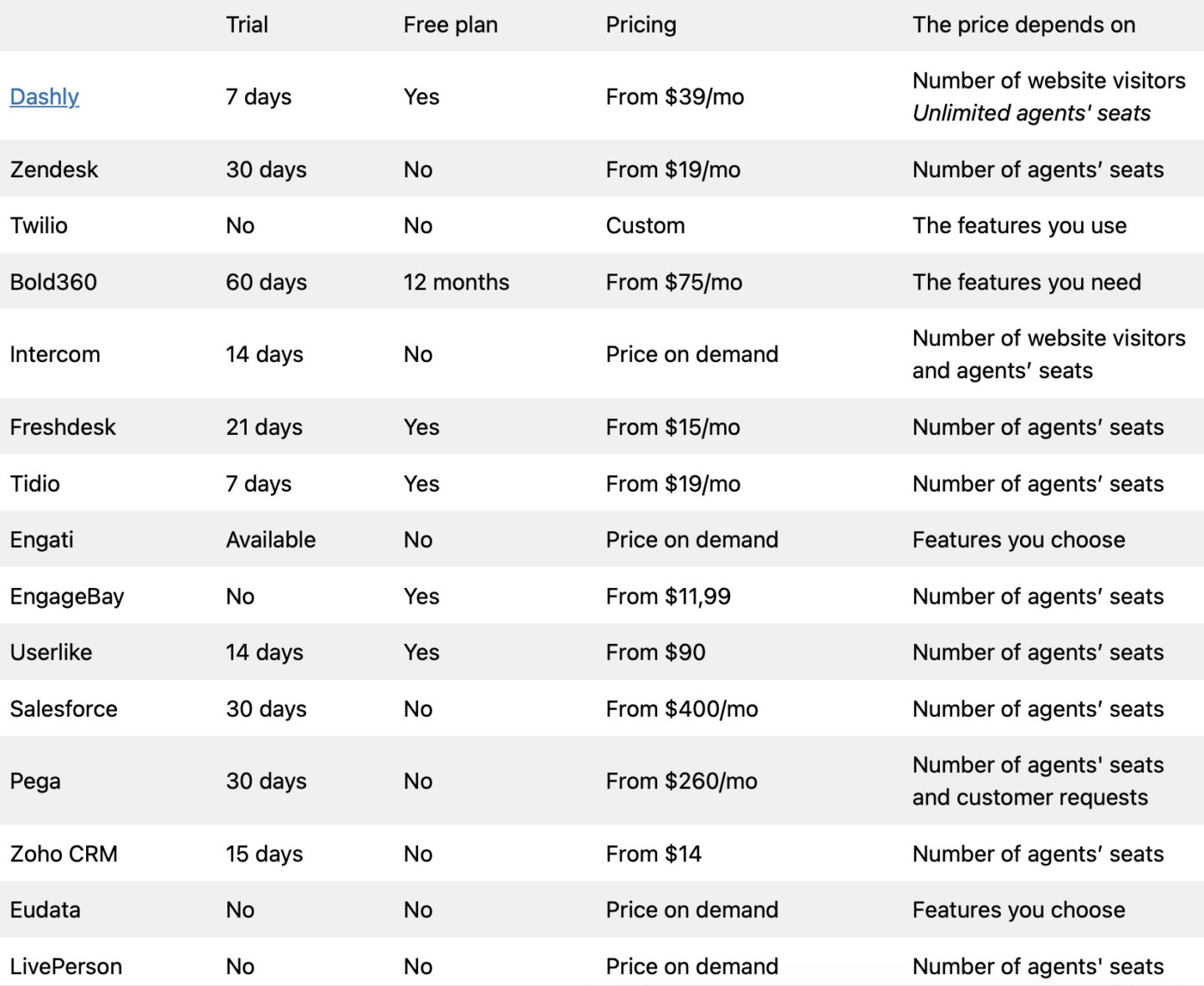
But of course, pricing might not be enough to decide. So we prepared a detailed review of their features, pros and cons👇
Dashly
Dashly provides support, marketing, and sales teams with a list of tools to automate their routine tasks — chatbot, live chat, triggered emails, and so on. You can set up Dashly in a couple of minutes without engaging developers and quickly start using all the instruments to boost your customer engagement.
Dashly helps focus on building a conversation on each step of the funnel: from the first session to the key action. Also, using this conversational platform, you can automate some communications and spend less human resources on customer service.
If you face problems with starting your first communications, there are ready-made campaigns, so you can launch them in several minutes.
Dashly features
Dashly offers its users:
- chatbot to proactively start conversations with website visitors and offload your customer support;
- live chat with mobile apps for Android and IOS;
- pop-ups with the pop-up builder to convert traffic into prospects;
- email campaigns to nurture prospects;
- knowledge base to provide self-service;
- 30+ integrations with CRMs, socials, email, and messaging apps;
- analytics reports;
- A/B testing;
- website visitors tracking, and more.
Pricing
Trial: available for 7 days.
There are three paid plans available, starting from $39/mo. If you’re a small business, connecting to first customers, Conversation might be enough for you.
However, if you want to launch proactive triggered campaigns for engagement, consider the Marketing plan. It offers the biggest number of chatbots and other triggered messages. Besides, this number can be increased with add-ons.
The price depends on the number of website visitors and add-ons you choose to include in your plan. There’s a calculator in the pricing page, so you’ll know for sure how much you’ll pay for the platform.
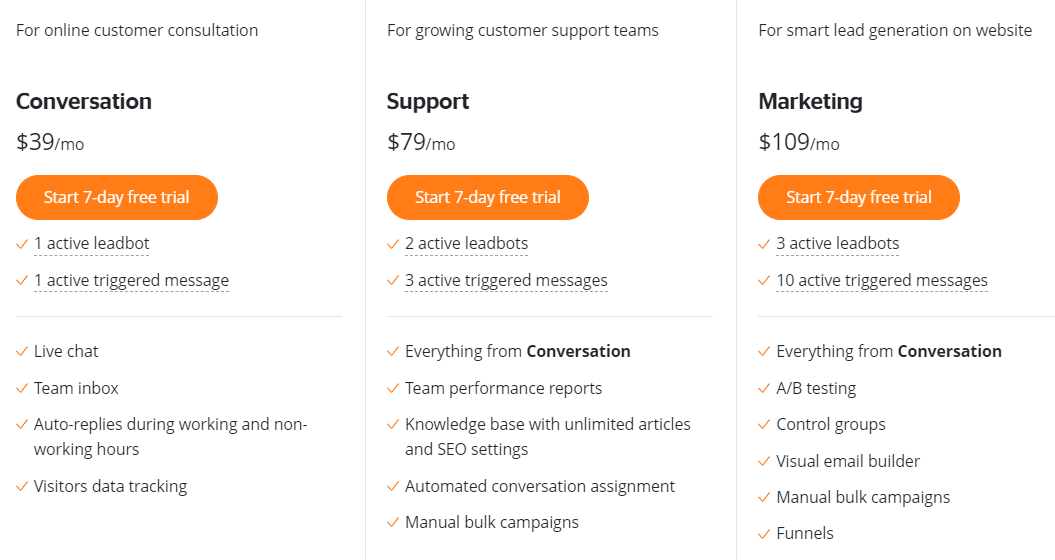
Dashly also offers a forever-free option with limited functionality. But it’s suitable for small companies that want to connect to their first users.
Pros and cons of Dashly
✅ A wide range of instruments to engage customers in the conversation;
✅ Flexible reports on the data collected.
✅ Integrations with your socials, messengers, CRM.
✅ Unlimited agents seats.
✅ Visual builders for every tool.
❌ No AI.
❌ No voice or video assistance.
Zendesk
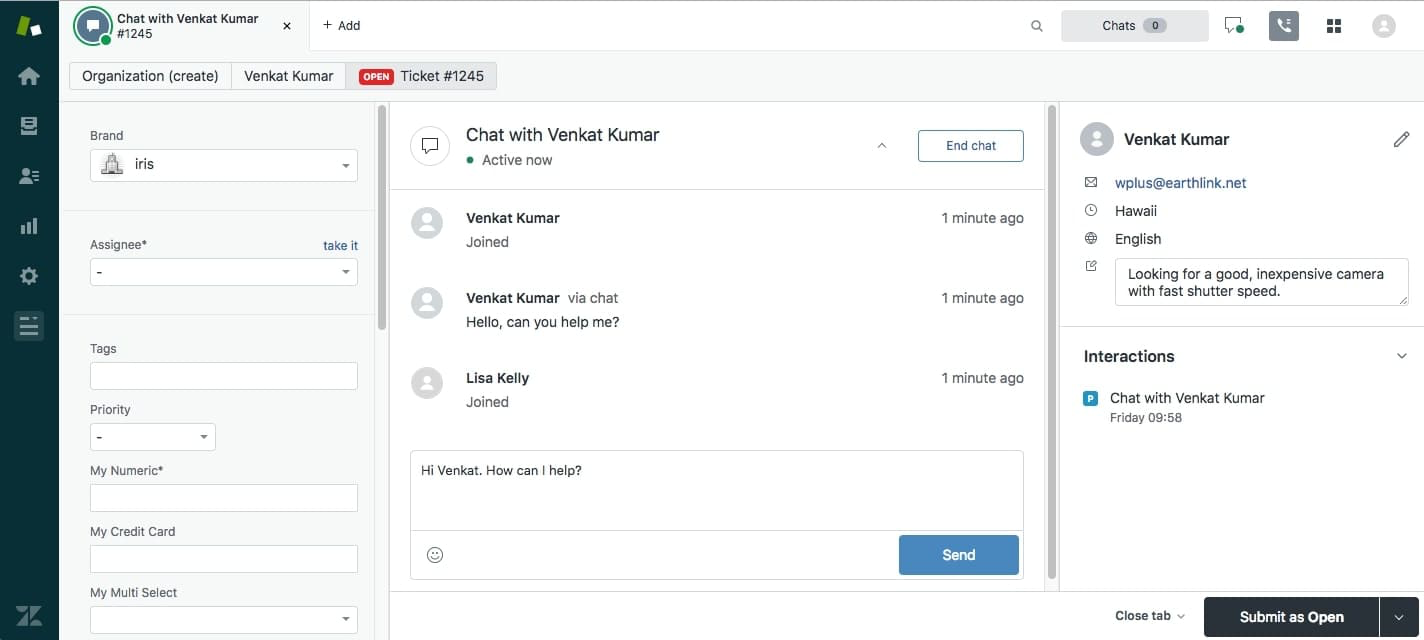
Zendesk is one of the best customer engagement platforms. It will help you launch personalized conversations with website visitors and pay off traffic investments. Zendesk is a solution for middle-sized and big SaaS and eCom companies. Thanks to the chatbot and other implementations, Zendesk enables 24/7 customer engagement and support.
Zendesk features
- livechat with mobile apps;
- chatbot;
- triggered emails;
- call function in the live chat widget;
- triggered messages and task automation;
- a lot of integrations, including Facebook, Instagram, WhatsApp, and so on.
Pricing
Trial: available for 30 days.
There are three plans: Team ($19), Growth ($49), and Professional ($99). The cost depends on the number of agents’ seats. Starting from the Growth plan, you’ll be able to use custom dashboards and reports, while using the Professional plan will allow you to automate some tasks.
Pros and cons of Zendesk
✅ AI technology.
✅ Supported in almost 40 languages.
✅ Easy to set up and onboard team.
❌ No email and pop-up builder.
❌ No detailed visitors analytics.
❌ No user-friendly templates.
❌ Advanced features are available only on expensive plans.
Twilio
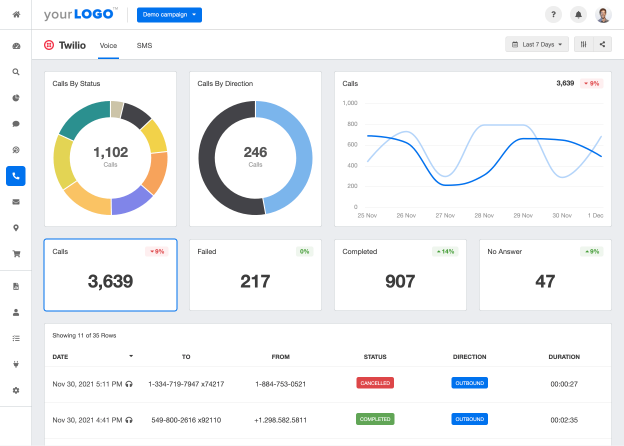
This is a customer engagement software specializing in personalized interactions and business communications with website visitors and customers. Twilio enables communications via chat, video, email, and voice. Also, API’s available.
This software is used mainly by small and middle-sized companies but still suits enterprises.
Twilio customer service features
- calls and messages
- Sendgrid email API
- WhatsApp API
- cross-channel conversation on SMS, MMS, and live chat
- in-app WebRTC video
Pricing
There are no plans — you can choose the features you need and pay for them separately.
The plans are divided into Programmable voice, Programmable messaging and SendGrid Email API. For example, emails start from $14,95/mo, while WhatsApp’s starts from $0,0042 per message.
Pros and cons of Twilio as a customer relationships platform
✅ Ability to pay only for those features that you’ll use.
✅ Good value for money (in comparison with other ✅ engagement platforms and apps).
❌ No marketing instruments such as pop-ups or chatbots.
❌ The Admin panel is non-intuitive.
❌ Unfriendly customer service.
Bold360 (Genesys DX)
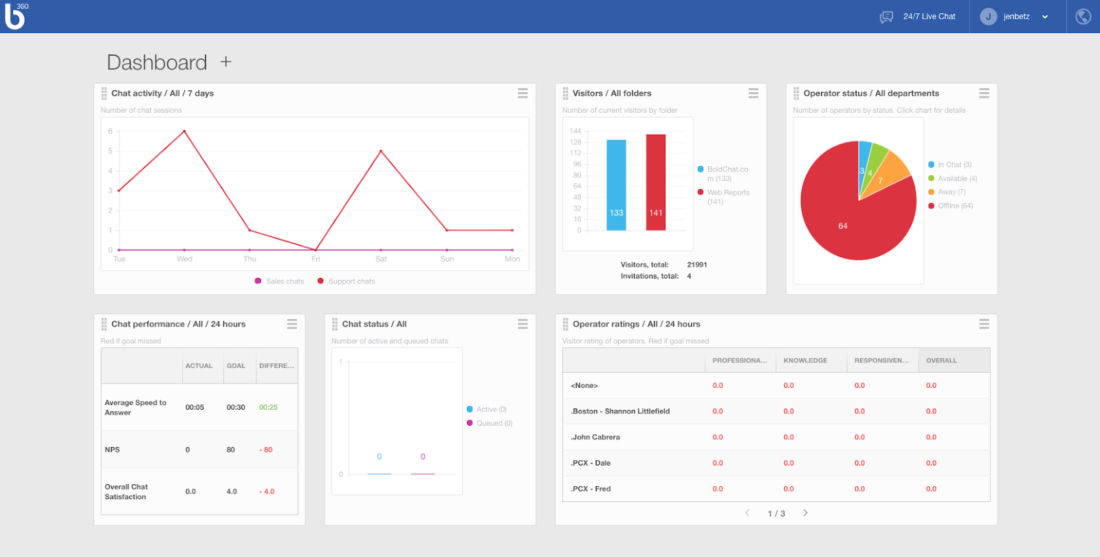
Bold360 (Genesys DX) is a platform that allows companies to deliver a seamless customer experience. Using AI, the platform enables personalization for better engagement in the conversation. This software mostly suits enterprises but will be helpful for companies from the mid-segment.
Bold360 (Genesys DX) features
The main advantage of this customer engagement solution is AI. Here are the features Genesys DX provides:
- AI-powered chatbot;
- live chat;
- multi-channel support;
- proactive customer support and engagement;
- triggered emails;
- omnichannel engagement (SMS, WhatsApp, Facebook, MS Teams, and so on).
Pricing
Trial: available for up to 12 months.
Overall, the service offers five payment rates to its customers, Genesys Cloud CX 1, Genesys Cloud CX 2, Genesys Cloud CX 3, Genesys Choice and Genesys DX™.
The Cloud CX 1 ($75) plan suits customer support teams — this offers such features as inbound and outbound voice calls, callbacks, and so on. The Cloud CX 2 ($110) is ideal for digital interactions — this adds to the first plan access to digital communication channels and AI-powered customer engagement. The Cloud CX 3 ($150) also includes workforce engagement management. There is also an option which allows you to choose features that you want to use.
Pros and cons of Bold360
✅ AI-powered.
✅ Easy to use and onboard your team.
❌ You need to pay for any extras in live chat.
❌ Customer report support being too slow.
❌ Data reports take too long to load and often are inaccurate.
Intercom
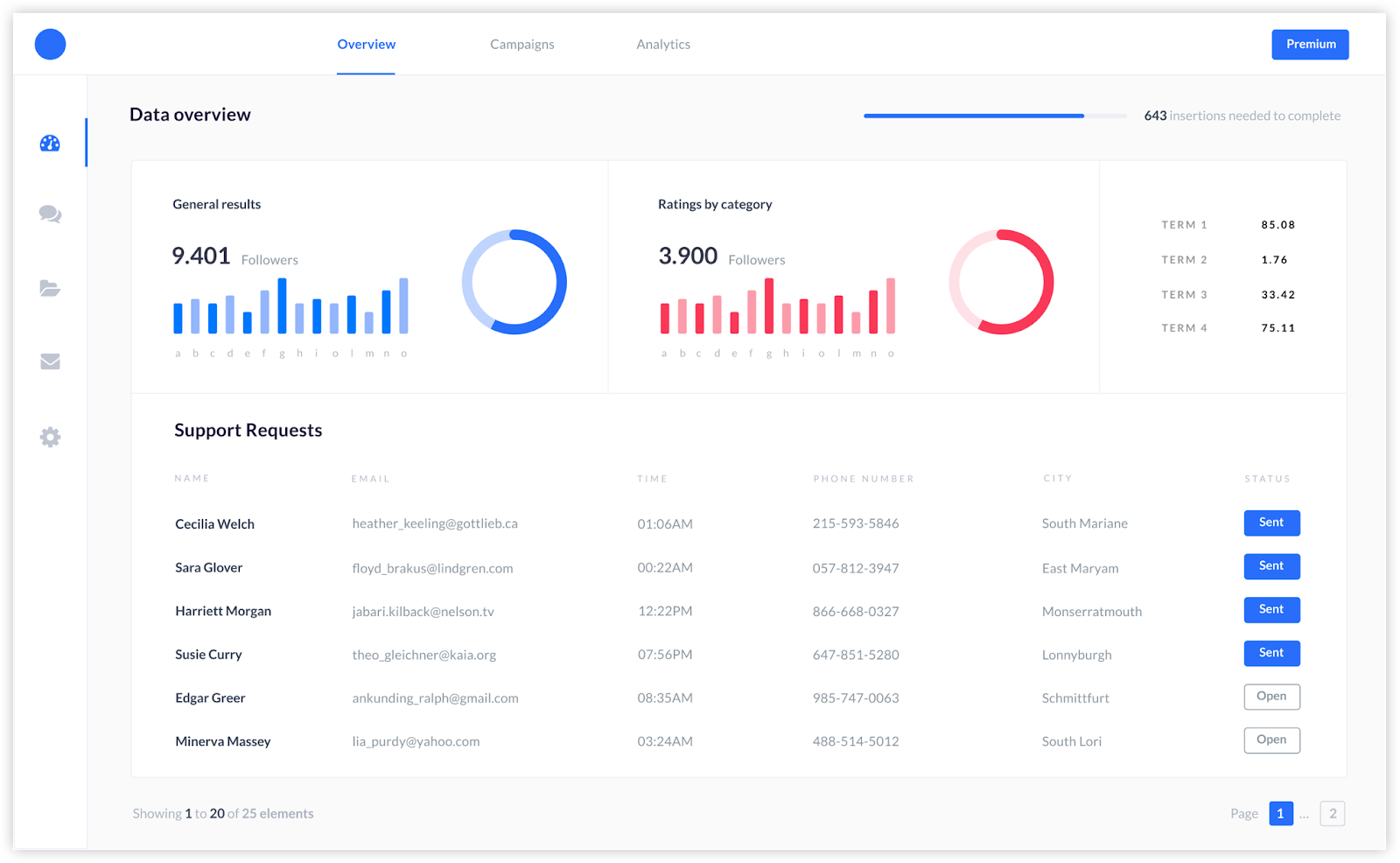
Intercom software may be too expensive for start-ups and small businesses, but it still offers a lot of features to meet the needs of support and sales teams. There are a lot of modules that enable you to launch communications on the web, mobile, or email.
Intercom features
- live chat and posts
- chatbots
- in-app surveys for collecting visitors’ data
- banners
- push notifications
- triggered emails (including surveys, dynamic content, and scheduling), and so on
Pricing
Trial: available for for 14 days, but you’ll have to give your credit card details.
There’s a Starter plan for very small organizations starts at $74/month if billed annually. Then you can choose among Support, Engage and Convert solutions.
Other information regarding the pricing is available by demand. Your subscription payment will depend on the agents’ seats you need and the number of people you reach monthly with outbound messages using Intercom.
When it comes to naming, the best option is the Engagement plan. It includes emails, push notifications, bots, banners, and other means that will help you boost the conversion rate on your website.
Pros and cons of Intercom comparing to other engagement platforms
✅ Software is easy to install and use.
✅ The service provides in-depth data about clients.
✅ Strong in-product feature set.
❌ It is too expencive, and plans are complicated.
❌ Customer assistance takes up to 24 hours to process your request.
Freshdesk
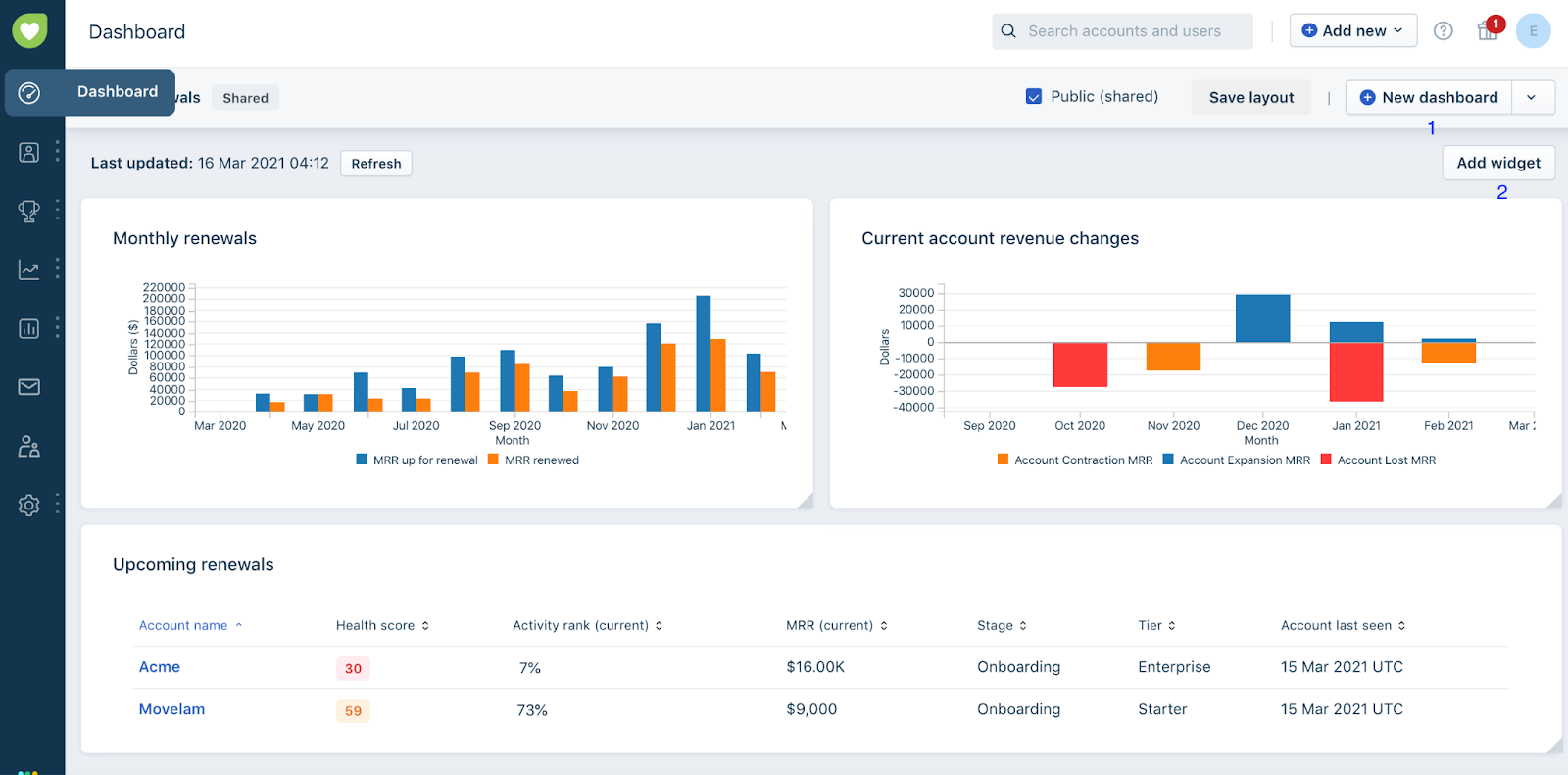
Freshdesk is a software that helps companies of all sizes boost customer activity and customer support. The service combines several communication channels and allows automated workflows so that you can deliver customer service with less effort.
Freshdesk features
- omnichannel customer communications (WhatsApp, MS Teams, telephony, and so on),
- automated follow-ups, escalation, and other tasks,
- custom dashboards and data reports,
- knowledge base,
- triggered emails and email bot.
Pricing
Trial: available for 21 days.
There are three paid and one free solution. You can use the Free plan’s email, knowledge base, and other features. The Growth subscription type ($15) also includes Automations. The Pro one ($49) adds API and custom dashboards, while the Enterprise ($79) allows you to use an email bot.
Pros and cons of Freshdesk
✅ Free plan is available.
✅ Easy to launch and onboard your team.
✅ A lot of integrations with other products and apps.
✅ Quick reports generation.
❌ Automation is slow sometimes.
❌ Not all the desktop features are available in the mobile app.
❌ No ability to change the subject in emails.
❌ Expensive if you want to use a chatbot.
Tidio
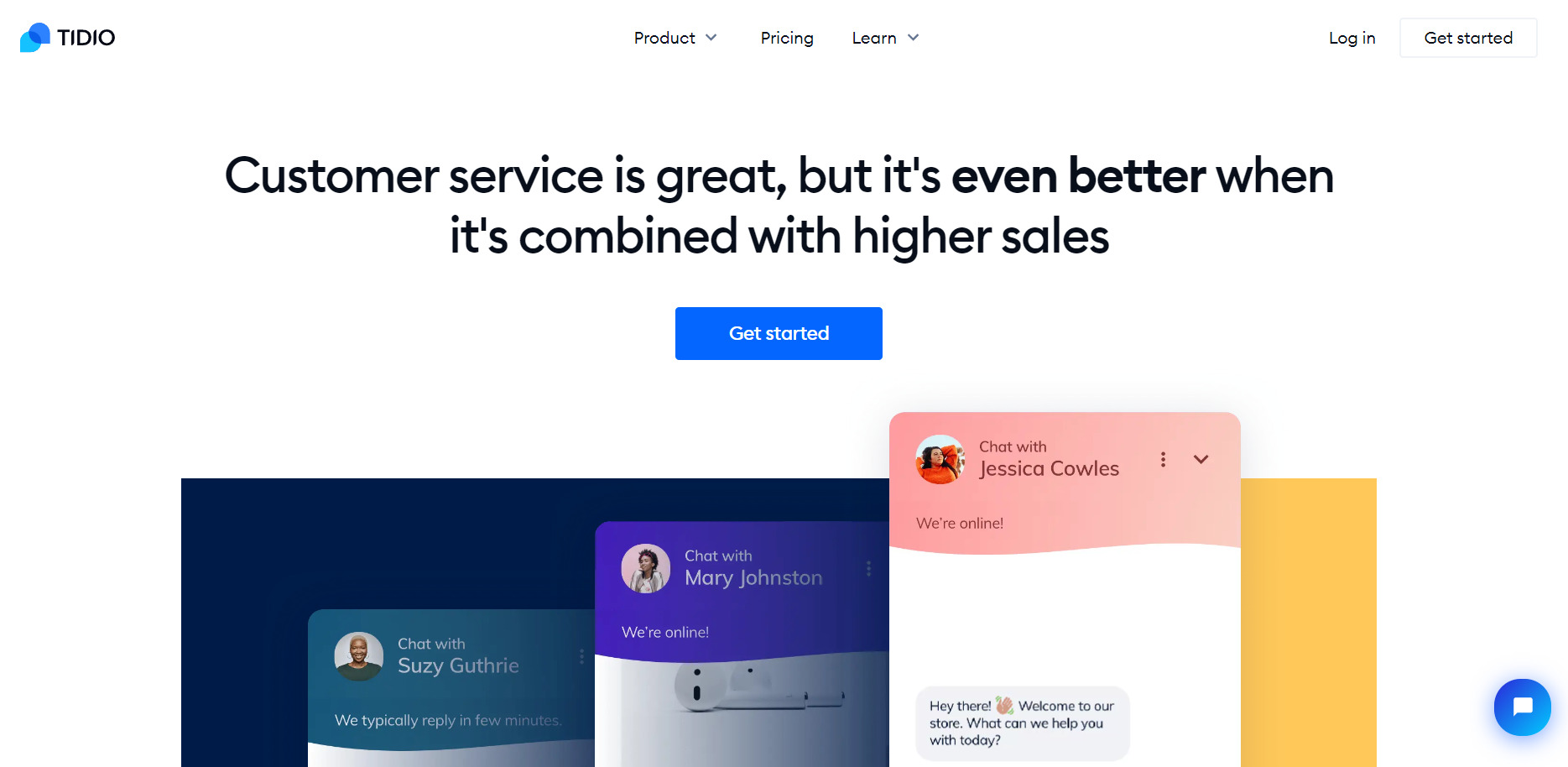
Tidio is a tool that promises to enhance both your support and sales teams. And it offers all the necessary instruments to engage customers. This software mostly suits mid-sized companies and bigger in different business segments.
Twilio features as a customer engagement software
Here you’ll find all the essentials:
- live chat with one inbox for all your communications;
- chatbot;
- analytics;
- visitor behavior tracking;
- integrations with social media, messengers and CRM.
Pricing
Tidio offers three types of subscription packages, starting from $19/month. The pricing depends on the number of users.
Trial: available for 7 days.
Customers can use the packages like Communicator ($19), Chatbots ($39) or Tidio+ ($289). There’s also a $0 subscription available with limited functionality.
Pros and cons of Tidio compared to other platforms
✅ The platform’s interface is intuitive and easy to navigate.
✅ Wide range of useful integrations.
❌ A lot of users say this solution is quite costly.
❌ The software might be buggy sometimes
Engati
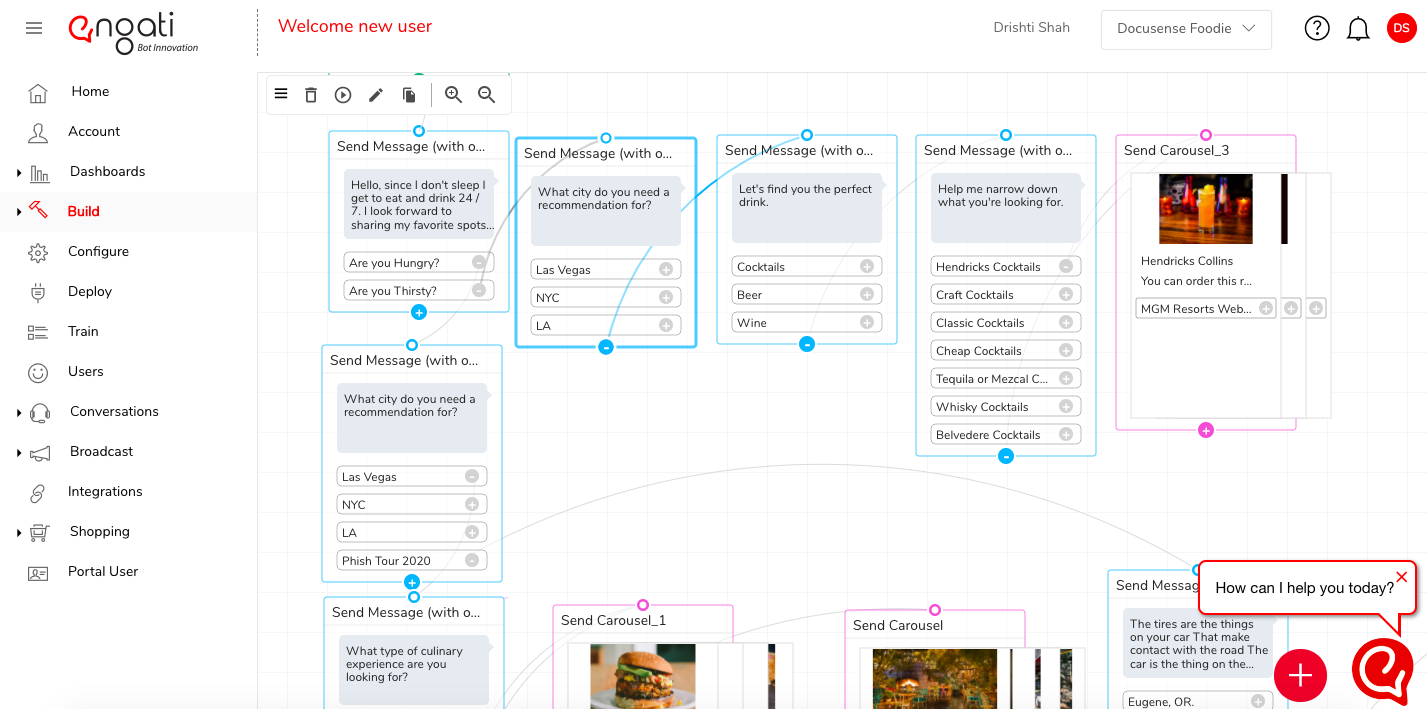
Engati is a live chat and chatbot tool for customer engagement increase. Using Engati, you can build a chatbot in just a few minutes and publish it across any of 15 integrated communication channels. It promises to help generate more leads, increase Conversion Rates, and boost team metrics of your support.
According to some customers’ reviews, the service might be too costly for startup segment, even though it eventually pays off. But the solution will perform the best for mid-market companies.
Engati features as a customer engagement software
There are two key features: livechat and chatbot. But along with these, Engati provides:
- pre-built and custom integrations (WhatsApp, Instagram, Facebook, Skype, Slack, and so on);
- custom reports.
Pricing
Trial: available, but gives access to limited functionality. The prices are available by request since it depends on the set of features you choose.
Pros and cons of Engati as a customer engagement software
✅ Visual chatbot editor and pre-built templates.
✅ Responsive customer support.
❌ Advanced integrations are available on the most expensive plan.
❌ Small feature set.
EngageBay
EngageBay combines means for support, marketing and sales teams. This customer engagement platform is designed to acquire and nurture leads. Using tools like triggered emails, web forms, marketing automations, and live chat, companies will close more deals and generate more revenue.
You can add up to 15 users for free, so it’s ideal for a segment of small and mid-sized companies.
EngageBay features as a customer engagement tool
- email templates
- ready-made campaigns
- live chat
- push notifications
- web forms
- web analytics, and so on
Pricing
A $0 plan offers instruments like triggered emails and message sequences, CRM, and live chat. The Basic plan (starts from $11,99) adds to this feature set templates, pop-ups, SMS, and other features. To get marketing automation, push notifications, and A/B tests, you’ll need to start the Growth plan (from $39,99). The Pro plan enables using web analytics and custom reports ($79,99).
Pros and cons of EngageBay
✅ Easy to set up and use.
✅ Responsive and friendly customer support.
✅ Lots of features.
❌ No calendar integration.
❌ The limited number of live chat triggers.
❌ The knowledge base and the documentation are a bit tricky.
UserLike
Userlike is a customer engagement platform focusing on live chat. It allows building communications across different channels, including Instagram, Facebook, WhatsApp, live chat, SMS, etc. Also, this enables proactive messages so that you can engage more users in conversation.
As a customer engagement platform, Userlike will be most beneficial for a small business, helping to boost sales, although mid-market finds this solution handy too.
UserLike features
- live chat
- chatbot
- video calls
- integration with WhatsApp, API access
Pricing
Trial: available for 14 days.
There is a free plan available — UserLike allows you to use livechat with the ability to send photos and videos. To unlock WhatsApp integration and add-ons, you’ll need to upgrade to the Team subscription (it starts from $90/mo). The Corporate subscription starts from $290 and enables using analytics and video calls. To use a chatbot and API, your monthly fee will start from $720.
Pros and cons of UserLike
✅ Easy to install and use.
✅ Intuitive interface.
✅ AI automated language translation.
❌ Chatbot is available only on the most expensive plan.
❌ Limited number of functions.
❌ System bugs appear sometimes.
Salesforce
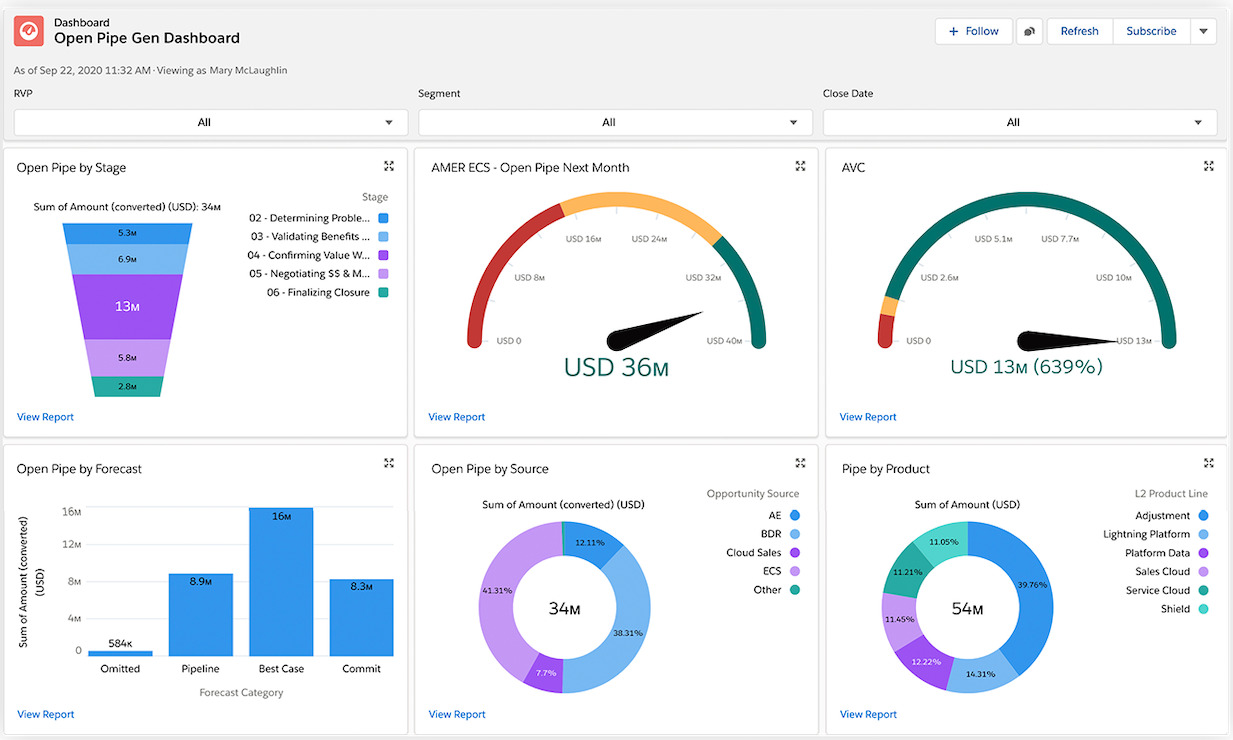
Salesforce is a complex tool that combines products for sales, customer support, marketing, commerce, and so on. It also offers means for customer engagement, personalization, and automation. In other words, there is everything for you to provide the best customer experience and boost customer engagement among website visitors.
This solution is the best for mid-market and enterprise companies that want to increase customer engagement.
Salesforce features
- triggered emails
- live chat
- chatbot
- content creation tools
- integration with Salesforce Sales Cloud so that you can unite sales and marketing data
- triggered responses and campaigns along a customer journey
- SMS, MMS, push-notifications
- A/B tests and analytics
Pricing
Trial: available for 30 days.
The cheapest plan, Basic, starts from $400, including email marketing, content tools, and integrations with Salesforce Sales Cloud. The Pro plan offers more advanced functions (starting at $1,250/mo). The Corporate plan (which starts from $3,750/mo) also adds AI and mobile messaging (SMS, MMS, and push notifications).
Note that the billing is annual — you must contact Salesforce support to pay monthly.
Pros and cons of Salesforce as a customer engagement platform
✅ Easy to use, friendly interface.
✅ Ability to customize everything.
✅ You can track a lot of customer data.
❌ Chatbot and many other advanced features are only available as an add-on.
❌ You need developers for additional functionality.
❌ Many customers find the license very expensive.
Pega
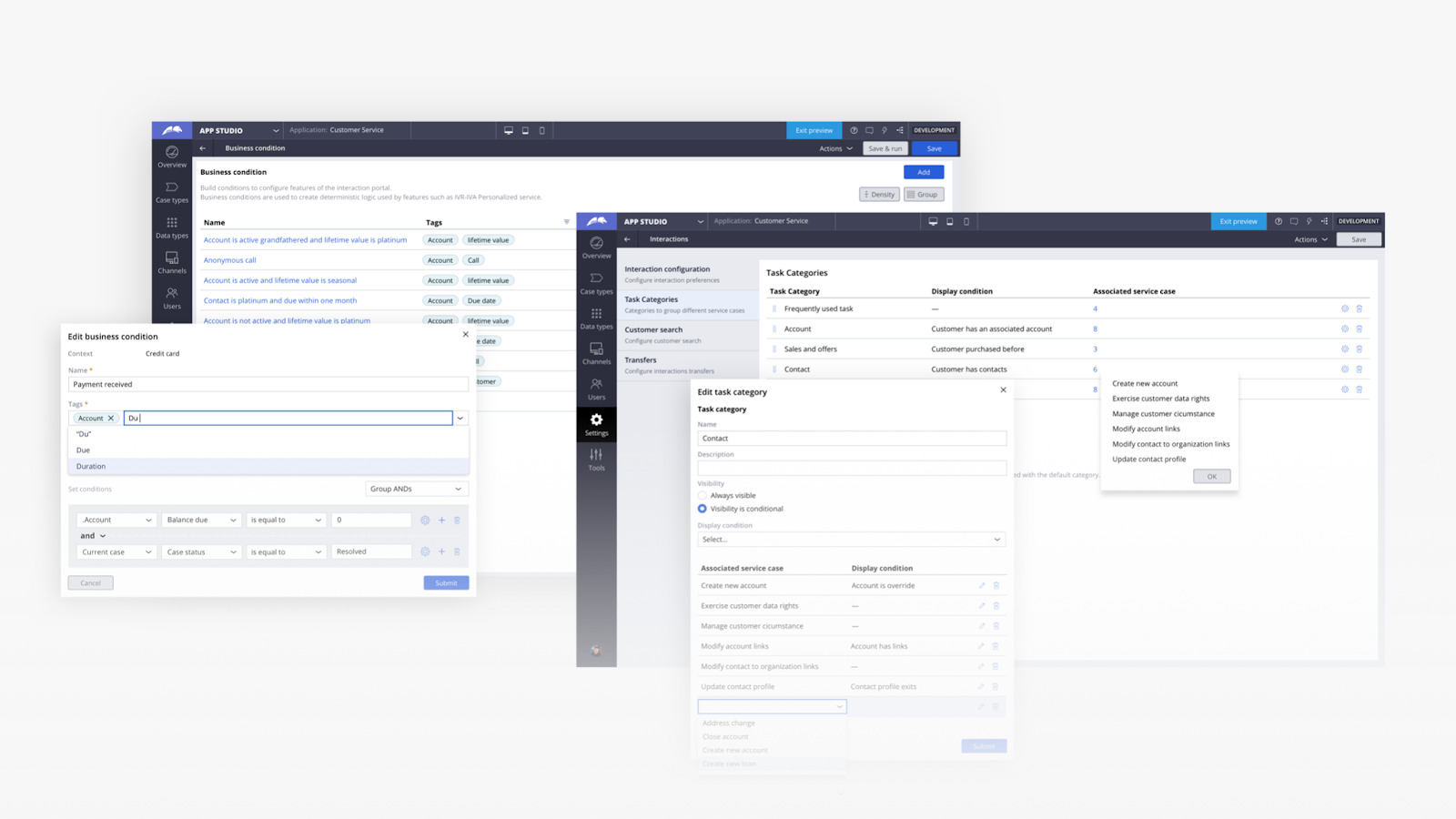
Pega customer engagement platform powers digital communication.
Due to the combination of artificial intelligence and customer communication tools, Pega can support you in delivering the best customer experience, increase customer engagement, and boost sales simultaneously. The solutions are most suitable for enterprise companies. Also, small and mid-market businesses find the platform handy.
Pega features
• AI-triggered engagement
• customer communication via SMS, email, mobile, and so on
• paid ad on LinkedIn, Facebook, and Google
• advanced analytics
• live chat
Pricing
There’s a 30-day trial period when you can test the platform’s functionality. Pega has a special paid subscription for customer engagement. It starts from $260/mo or $1.26/case. The pricing depends either on the number of users or customer service request cases.
Pros and cons of Pega as a customer engagement platform
✅ AI for better engagement.
✅ Customizable UI.
✅ Easy to integrate with other apps.
❌ Setting up the process may be tricky.
❌ There are not enough resources: no open data about the cost.
❌ Slow-working customer support.
Zoho CRM
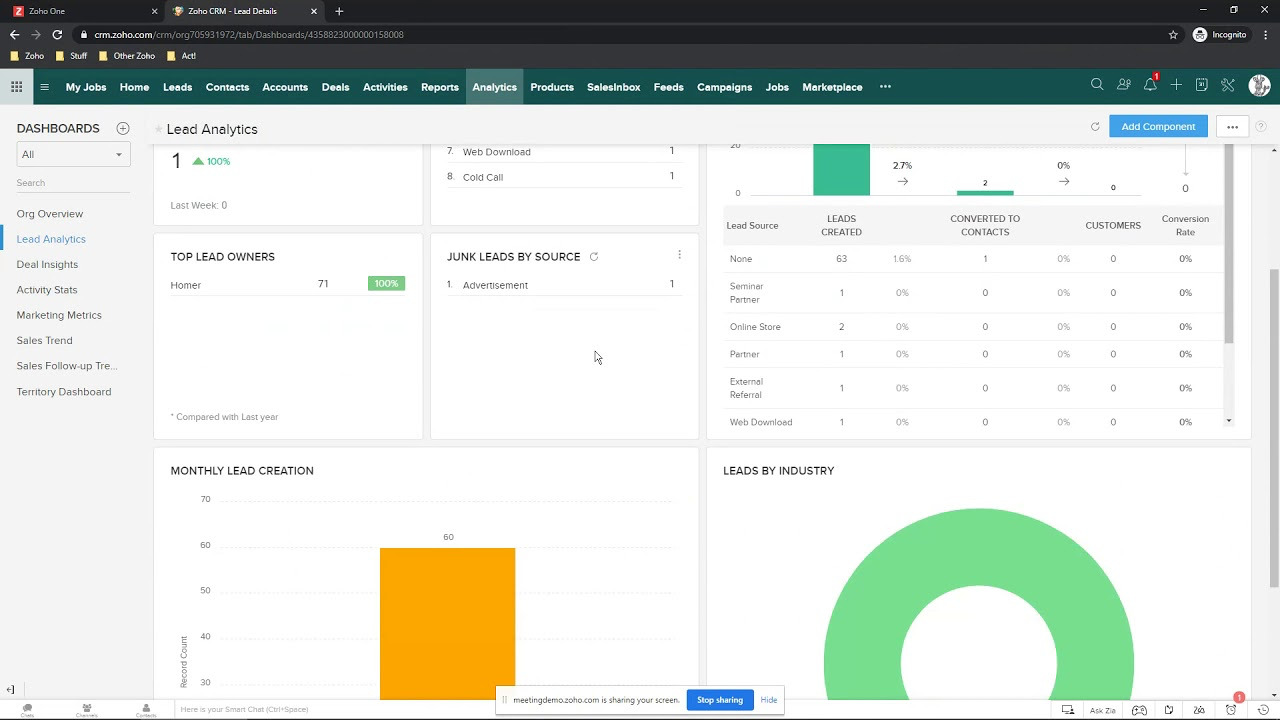
Zoho CRM is a customer relationship solution that enables automation, personalization, and analytics.
Among the key services of Zoho CRM are marketing automation, sales funnels, seamless integrations, analytics dashboards, and so on. So, the platform will be great for small businesses and mid-market companies.
Zoho CRM features as a customer engagement platform
- email marketing including email parser
- marketing funnels
- standard and custom dashboards
- marketing automation
- web forms
- integrations, and API
Pricing
Zoho CRM offers a 15-day trial to test the platform’s functionality. The standard subscription offers email marketing and a custom dashboard. It starts from $14/mo. You’ll need to upgrade to the next subscription type — the Standard, to get automated lead generation from social networks.
The Enterprise plan (starting from $40/mo) allows you to use an email parser, AI for email analysis, marketing funnels, and A/B tests.
The Ultimate plan ($52) makes all the Zoho tools available to use.
Pros and cons of Zoho CRM as a customer engagement platform
✅ User-friendly interface.
✅ Easy to set up and use.
❌ Slow-working customer assistance service and different agents can give different answers to the same question.
❌ Limited customization.
Eudata
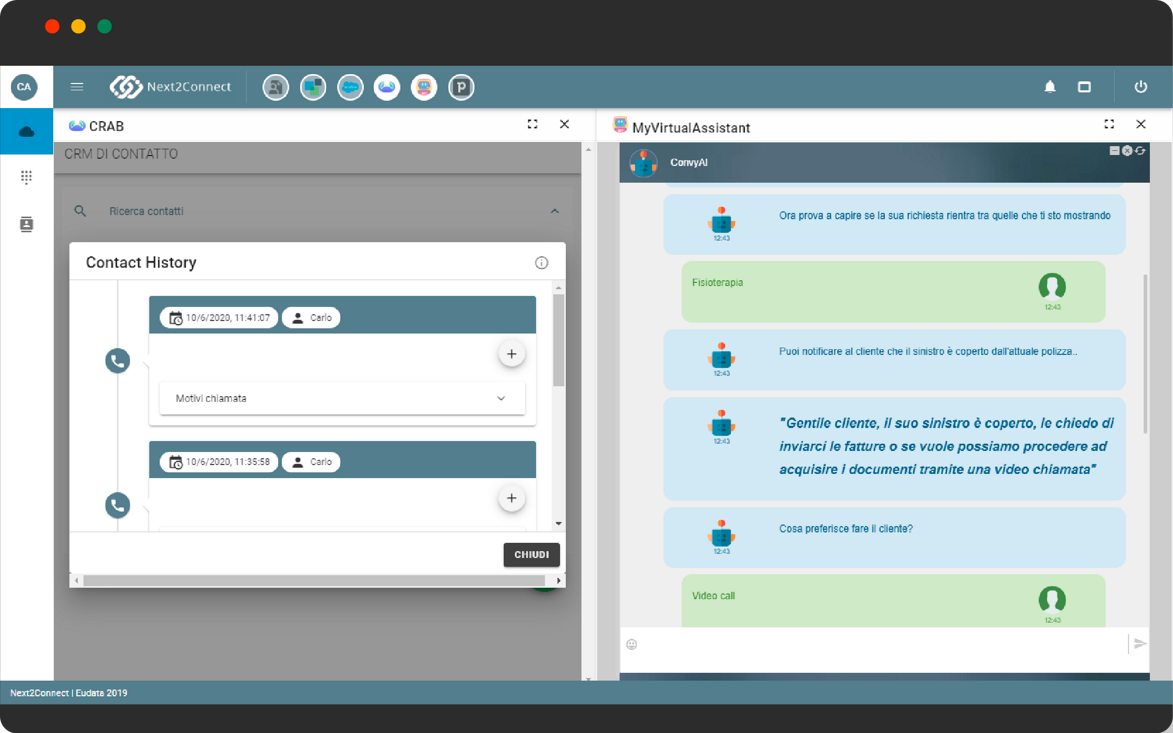
Eudata is the customer engagement platform that integrates the most popular customer communication channels: WhatsApp, Facebook, Telegram, and so on. Eudata helps automate customer engagement and increase the Conversion Rate while reducing the cost of sales.
Zero code interface allows running campaigns even if you’re a non-technical person.
Eudata best suits mid-market and enterprise businesses.
Eudata features as a customer engagement platform
- live chat
- chatbot
- customer segmentation
- third-party integrations
- dashboards, and analytics
Pricing
Eudata offers custom prices, so to know the exact amount, you need to contact the sales team.
Pros and cons of Eudata as a customer engagement platform
✅ Easy to integrate with other platforms.
❌ You have to schedule a demo before you’ll find out the pricing.
❌ Configuration may be a bit tricky as it’s difficult to find documentation.
LivePerson
LivePerson combines lots of means for better customer engagement. This platform will help you boost Conversion Rates using conversational ads, capture more customer data, and build omnichannel communication. As an engagement platform, it also enables you to launch proactive marketing campaigns to target potential customers and personalize the customer experience on your website, all of which could improve the sales.
This customer engagement platform is designed for mid-market businesses.
LivePerson features as a customer engagement platform
- ads on Instagram and Facebook
- proactive communication via a live chat
- multi-channel communication via SMS, WhatsApp, or voice call
- push notifications and pop-ups
- marketing automation
Pricing
To know the exact price for your business, you need to contact the support and request a demo.
Pros and cons of LivePerson as a customer engagement platform
✅ Intuitive interface.
❌ Customer help centre may ignore your requests.
❌ Analytics system may not match with other products you use on your website.
How to choose between customer engagement platforms
There are so many platforms and services that it may be very tricky to choose one for you. Needs differ from business to business, so pay attention to those customer engagement platform tools that will meet your requirements and business goals.
We advise you to pay extra attention to the following features:
- Live chat is a must-have for customer support. When a customer visits your website and explores your product, some questions might pop up. They may leave your website forever if they can’t find who to ask or where to do it. Don’t fence off the questions. It’s better when your live chat engagement is high — this shows that customers are interested in your product.
- Lots of companies use a chatbot as proactive customer assistance and engagement tool. Say a user visits your website. You send an “I’m here if needed” message via chatbot to engage them in conversation, and turn a website visitor into a prospect.
- Video/audio calls are a kind of supplement to a live chat. Sometimes it’s more convenient to book a call than try to explain some complicated issue via message.
- Analytics is a must-have in your tech stack to track the efficiency of your marketing and support activities. For convenient use, they better be embedded into a customer engagement platform.
- The opportunity for omnichannel communication with customers. If a prospect starts communicating on Instagram/WhatsApp but finishes it in a live chat, you won’t lose a single message and stay in the context.
- Pay attention to integrations — check if a customer engagement platform you chose integrates with other apps you already use.
Now, let’s explore what customer engagement system exist, what tools they offer, and how suitable they are for your business. Platforms on this list suit brands of different sizes with different budgets.
If you don’t have time to read, check out our hit parade of the best customer engagement platforms in this video 👇
The bottom line
Phew, 15 platforms, what a journey! We’re sure at least one of them will help you strengthen relationships with your customers and increase loyalty to your brand. We advise you to test a few services on a trial period to find the one that fits your business’s needs.
You can start with Dashly 😊 In this case, you get:
— a full-fledged platform with a wide range of features to set up an engagement system on your website;
— visual builders for each instrument that require no coding skills;
— ready-made templates for chatbots, pop-ups, and emails to save your time;
— friendly, responsive support team that is ready to help with any question you have.
FAQ on customer engagement platforms
This is a platform that helps businesses interact with their website visitors and provide a better customer experience. Businesses use it to build communications on each marketing funnel stage. There are several tools for this: chatbots, live chats, pop-ups, triggered emails, etc.
Dashly is a great example of a customer engagement platform. Sign up and test its functionality off-charge for 7 days.
Basically, CRM is database companies use to keep all the vital data about their clients in one place. There is a lot of information CRM can contain personal data, preferences, complaints, number of orders, etc.
Oppositely, a customer engagement platform is used to interact with existing clients to grow their loyalty, with prospects to upgrade them to clients, and with website visitors to catch their contacts. But it’s a great advantage if your customer engagement platform can integrate with your CRM as Dashly can.
There are plenty of them. The most often used customer engagement tools are:
— live chat and chatbot to proactively engage website visitors in a conversation and collect their contacts,
— pop-ups to engage in a new feature, collect contacts or just drive attention to something crucial,
— email camapigns to nurture prospects,
— in-app communications and push notification to engage mobile app users.
It becomes more challenging to catch users’ attention as the number of competitors in every industry grows. With the help of such tools as chatbots, live chat, pop-ups, emails, and others, customer engagement platforms help brands to build an emotional connection with customers and keep them more loyal.
Besides, customer engagement software pay off rather quickly since they offer a wide range of instruments and you don’t have to pay for each of them separately. Check out Dashly pricing, for example, to know how much a customer engagement software will cost your business.
Customer engagement is the communication bridge between businesses and their customers. The best customer engagement platform is a tool that widens this bridge, opening up interactive two-way communication, boosting customer rapport, and refining the overall customer experience. It’s all about keeping your customers connected and satisfied!
Here are a few notable examples of customer engagement companies:
Dashly.io: Specializes in customer engagement and offers real-time interaction features.
Hubspot: Known for its robust CRM, it improves customer relationships through effective engagement.
Intercom: Offers personalized customer experiences with its modern, messaging-first approach.
Freshworks: Provides tools for customer support, including helpdesk and call center solutions.
Zendesk: Enhances customer service with multi-channel support and data-driven insights.
Salesforce: An all-round customer journey specialist with deep data analytics.
These companies give businesses the tools to level up their customer engagement and service, significantly improving customer experiences.
An example of customer brand engagement? Think Nike’s client engagement platform, where they launch interactive campaigns that engross customers. Or, consider Starbucks’ consumer engagement platform that rewards customers for their loyalty. These strategies make customers feel more connected and valued by their favorite brands.
Read also:
- Acquisition funnel marketing: Grow customer conversions at each step of user journey
- The top 15 inbound marketing tools: harness digital power and elevate your business
- Top 10 customer segmentation tools to personalize customer communications
- 20 AI sales tools: Boost your sales strategy with revolutionary technologies

